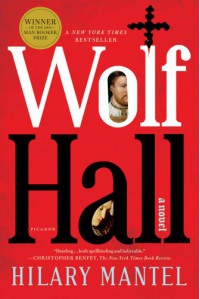Wolf Hall, or an Abundance of Thomases

Having confused Thomas Cromwell with Oliver Cromwell (understandably, I think -- besides, it turns out that they’re related through Thomas Cromwell’s sister, so it’s not that much of a stretch), my expectations of this book were a little skewed. It was only when I reached the latter half of the book when I realized my knowledge of history wasn’t matching up with the events in the story, and Wikipedia confirmed my error. So whoops.
At any rate, it was a compelling read, even as it completely derailed my understanding of Thomas Cromwell. Hilary Mantel is an unparalleled master of the written word.
"The page of an accounts book is there for your use, like a love poem. It's not there for you to nod and then dismiss it; it's there to open your heart to possibility. It's like the scriptures: it's there for you to think about and initiate action. Love your neighbor. Study the market. Increase the spread of benevolence. Bring in better figures next year."
With this paragraph alone, Mantel paints an excellent picture of Thomas Cromwell's character. He's the kind of man who would equate business with poetry, with religion. Cromwell was not a man to sit around wringing his hands -- what with the business of building up an efficient and lucrative business and managing the affairs of the king, he had better things to do with his hands.
Not to be outshone, of course, are Henry VIII and Anne Boleyn. Is Henry VIII a figure to be pitied as a royal puppet, crippled by his endless entourage of sycophants yet possesed no real power to make decisions of his own? Or is he to be reviled as a spoiled and insatiable horndog for whom one woman was pretty much the same as the next, tossing generations of law and custom out the window just to have the one who wouldn’t tumble into bed with him?
And what of Anne, whose complexities and political machinations were formed as much from her own ambition as the society around her?
"You see," she says slowly. "I was always desired. But now I am valued. And that is a different thing, I find."
The only avenue for success for a woman back then was marriage, and who can blame a girl who wants to rise to the top, against all the odds? Yes, she did break up a royal marriage (thus incurring a whole host of political problems for the crown), cast a large number of politicians and Cardinal Wolsey into disgrace, and inadvertently overthrow the entire religious and legal history of England, but hey, a girl’s gotta do what a girl’s gotta do, right?
Or is the true culprit here ye olde English society, regarding women as nothing more than broodmares for the all-important task of perpetuating the royal line? Nobody forced the Boleyn family to hurl their daughters at Henry, and everyone was too busy toadying up to him to stop and say “wait a minute sir this is possibly a bit extreme.”
Well, I don’t know. Greater historians than I (not that I consider myself one, because my pretensions only extend as far as my bias) probably have lengthy and better informed debates that go down to minutiae.
And all throughout, Thomas Cromwell, proof that one can scrabble one's way up out of the dirt from whence one came and into self-made prominence. With the king's ear in one hand and the king's purse in the other, Cromwell was the man who made things happen, with a whispered word here and a palmed coin there.
 1
1




